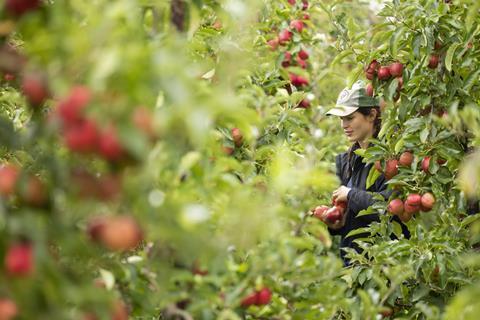Developers, local authorities and retailers can all play a part in securing the future of commercial, cider and community orchards, new report finds
Housing, competing land use and climate change are among the threats to the future of UK orchards, as growers decide against investing in new plantings.

That’s according to a new report that has tracked the challenges facing traditional, commercial and community orchards across the UK, and offered a five-point plan to ensure a better future.
Published today on World Apple Day (21 October), the report comes three weeks ahead of international climate talks COP30. It highlights key opportunities, from reducing UK reliance on apple, plum and pear imports to investing in skills, job creation and new technology.
The research, by sustainability organisation Forum for the Future involved 12 months of in-depth research and sector-wide consultation with more than 150 stakeholders.
Findings included:
- Competing land use priorities – including new housing – has driven the loss of more than half of all orchards in England and Wales
- A climate crisis that is causing more frequent and extreme weather events, as well as new pests and diseases, both in the UK and countries we source from
- An over-reliance on imports; the UK is only 40 per cent self-sufficient for apples and nine per cent for pears and plums
- Difficulties for commercial growers as rising production and labour costs, as well as investment in new technology, make livelihoods hard to come by
- Consumer preference towards apples of a particular taste, size and colour, which drives lower grower profitability
- Looking at imports, the report found 50 per cent of apples sold in the UK are imported from France, Italy and South Africa
“Everyone has a role to play in creating a better future for the UK’s much-loved orchards,” said Forum for the Future’s senior change designer, Katherine Zscharnagk.
“Whether it’s supporting growers with long-term contracts, commercialising more of the fruit grown, making more land available, or trialling new models that make farming more feasible, urgent and systemic steps are needed now,” she said.
The report outlined three key steps to preserve the UK orchards, including:
- British top fruit growers need to share risk with long-term, responsive contracts that allow them to continue investing in their orchards
- Community orchards must be supported by local councils and maintained long-term by community members equipped with the right training and resources
- Orchards should be protected and funded for their biodiversity and other environmental benefits. Developers must work with local councils and communities to preserve traditional orchard spaces and put plans into action for planting and maintaining new ones
Alongside this, orchard fruit production should be incentivised as a viable and desirable career, the report found, noting that UK cider, like French wine, is sought after for its unique taste and regionality.
Representatives from across the top fruit supply chain took part in the research, including trade body British Apples & Pears (BAPL), charity The Orchard Project and cider maker Find & Foster.
“We welcome this new report and are a sector that is ambitious to grow market share from 40 to 60 per cent,” said BAPL executive chair, Ali Capper.
“We know this is possible because in the last 20 years, the amount of apples produced from a static land area of 5,500 hectares has more than doubled – this is an amazing productivity achievement.
“Growers need long term contracts and fair returns from the market and significant tax reliefs from government in order to make the investments needed in British orchards,” she added.
Kath Rosen, CEO at The Orchard Project, said: “Community orchards bring local, inclusive, and long-term solutions to social and environmental challenges by equipping communities with the skills and resources needed to effectively steward green spaces.
“They strengthen food security, enhance biodiversity, and create social infrastructure that supports wellbeing and resilience across the UK and this report makes recommendations as to how we ensure their future.”



